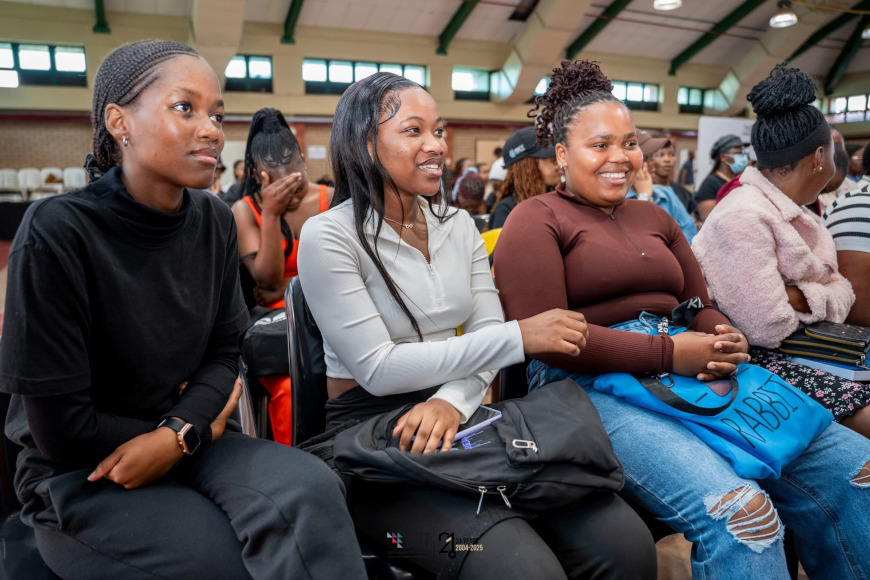The Centre for Excellence in Learning and Teaching (CELT) in collaboration with the Student Services Unit at the Durban University of Technology (DUT) recently hosted a Student-Led Conversations Programme at Ritson campus hall in Durban. Themed The DUT We Want: Leveraging Our Agency to Foster the DUT Way “Nothing for Us Without Us,” the event brought together students, staff, and university leadership in a powerful dialogue aimed at shaping DUT’s future through active student participation.
The purpose of the event was to create a reflective and collaborative space for students to share their personal journeys and lived experiences at DUT over the past six months. It served as a platform for open and honest dialogue about the challenges and opportunities that impact student success, with the goal of promoting a more holistic understanding of academic, emotional, and social well-being. Through these conversations, the university aims to explore how it can better support students in achieving their full potential and in co-creating a university environment that reflects their needs, dreams, and aspirations.
Dean of Students at DUT, Dr Clement Moreku welcomed attendees and expressed his appreciation for the student-led conversations. He noted that even if the dialogue resulted in just one or two transformative student-led initiatives supported by the institution, it would mark significant progress. He described the gathering as an opportunity for reflection, connection, and meaningful action. Emphasising the importance of student engagement, he encouraged students to rise with purpose, discover their voices, and become a united force in building a more inclusive and transformative university community. Referring to the theme of the day, Dr Moreku reminded students that this was not just a vision, but a challenge for everyone to think critically about the kind of university they want to shape and leave behind for future generations. He reiterated that the core of the discussion was rooted in DUT’s shared values and long-term vision, ENVISION2030, which promotes stewardship, social responsibility, systems thinking, and sustainability.
Mr Masiza Ngculu, Manager of Student Governance and Development at DUT urged students to approach the conversation with maturity, openness, and respect for diverse perspectives. He acknowledged the role of past student leaders in the room and emphasised that leadership does not end with a title, it is a lifelong commitment to service. He encouraged students to reflect deeply on their values, the meaning of citizenship, and how their education, family background, and financial awareness could be used to shape their futures. Ngculu expressed confidence in the students’ potential, affirming that some of them might one day lead the nation, and encouraged them to embrace the space and rise to the challenge.
Acting Director of the Centre for Excellence in Learning and Teaching, Dr Shoba Rathilal spoke on the importance of meaningful engagement, stating that the aim of these conversations was not merely to share experiences or frustrations, but to create intentional, inclusive spaces for innovation and collaborative action. She highlighted that student success must be understood as a holistic journey that involves identity, purpose, and meaningful contribution, not just academic achievement. Dr Rathilal emphasised that DUT’s commitment to transforming lives and communities must be reflected in how student experiences are addressed and improved.
Fezeka Majombozi, representing the Student Representative Council (SRC), expressed gratitude for the opportunity to be part of a meaningful and transformative conversation. She emphasised that student voices must be heard clearly and consistently, noting that a connected student community holds the power to drive real change. She stressed that the theme, “Nothing for Us Without Us,” was more than just a slogan it was a call to action. She called on the institution to ensure that students remain central to decision-making, policy development, and the overall direction of the university. She praised the programme for aligning with DUT’s bold vision and for creating a space where students are empowered to take ownership of their shared future.
Dr Mzwandile Khumalo, Coordinator of the Student Academic Support and Development Unit, underscored that students are the heart of DUT. Dr Khumalo reflected on the impact of student activism, urging that it be constructive and aligned with the university’s goals. He warned that disruptions such as strikes negatively affect the academic calendar and student progression, especially for first-year students. He called on students to take responsibility, actively engage with support initiatives, and work collaboratively to improve their learning environment.
He also introduced the panelists for the students leaders panel discussion Luyanda Zulu, President of the Council on Higher Education (CHE), and Sihle Nkosi, SRC Finance Officer for Students Representative Council. The panel discussion focused on identifying barriers to student success and explored practical ways to overcome them. Panelists also reflected on how student voices could be more effectively integrated into university decision-making processes. The discussion emphasised the importance of individual actions in contributing to the collective success of the DUT community.
Following the panel discussion, students actively engaged by asking questions and sharing their perspectives, further enriching the dialogue.
In closing, Administrative Officer at the Student Governance and Development unit at DUT, Ms Kholeka Mfeka expressed her heartfelt gratitude to all who attended and actively participated in the engagement, thanking them for their questions, shared experiences, and thoughtful contributions toward solutions that could enhance student success.
Pictured: DUT students during the Student-Led Conversations Programme.
Photographer: Khulasande Tshayile.
Sinamile Sithole

